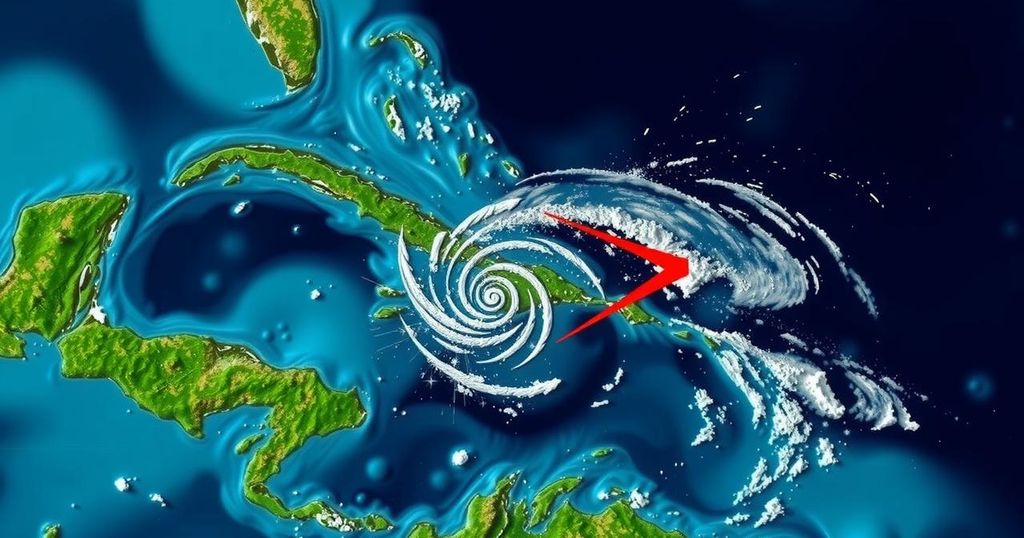Tropical Storm Oscar is progressing towards the Bahamas following its landfall as a Category 1 hurricane in Cuba, which resulted in at least six fatalities and heavy rainfall causing flooding risks. The storm is recognized for being the smallest hurricane recorded, with significant unexpected intensity. Experts warn about the challenges of effective hurricane forecasting as the season remains active with potential for further storms.
Tropical Storm Oscar is advancing towards the Bahamas subsequent to its landfall in Cuba, where it was classified as a Category 1 hurricane that resulted in the tragic deaths of at least six individuals. The storm has unleashed significant rainfall on Cuba, which is concurrently experiencing a large-scale power outage. As of Tuesday morning, Oscar was recorded to be approximately 45 miles (75 kilometers) south-southeast of Long Island in the Bahamas, with wind speeds of 40 mph (65 kph) and a north-northeast movement at a rate of 12 mph (19 kph), as reported by the National Hurricane Center in Miami. At this juncture, the hurricane center noted that “Oscar is at best barely a tropical storm at this time.” Forecasts suggest that the southeastern Bahamas may receive up to 5 inches (13 centimeters) of rain, with isolated regions potentially seeing as much as 8 inches (20 centimeters). A tropical storm warning has been issued for the central and southeastern areas of the Bahamas. Remarkably, Oscar is distinguished as the smallest hurricane on record, with a wind field measuring merely 6 miles (10 kilometers) in diameter. Its unexpected turn to hurricane status prior to landfall on Grand Inagua Island in the Bahamas on Saturday and a subsequent landfall in eastern Cuba on Sunday took many experts by surprise. Hurricane specialist Michael Lowry commented on the unusual forecasting error, stating, “It’s not often we see a colossal failure in hurricane forecasting,” noting that predicting models did not indicate that Oscar would evolve into a hurricane. In its passage through Cuba, Oscar released over 15 inches (38 centimeters) of rain in certain eastern regions, prompting warnings of severe flooding and potential landslides. The fatalities reported were concentrated in Guantánamo, with the storm’s occurrence exacerbating existing recovery challenges faced by the nation due to a significant blackout that had incited minor protests alongside government admonitions against unrest. Oscar represents the 15th named storm and the 10th hurricane of the Atlantic hurricane season, which commences on June 1 and concludes on November 30. Additionally, the National Oceanic and Atmospheric Administration has forecasted an above-average Atlantic hurricane season for this year, attributing this expectation to record warm ocean temperatures, with predictions of 17 to 25 named storms and 4 to 7 significant hurricanes of Category 3 or above by season’s end. Meanwhile, Tropical Storm Kristy remains distant over open waters in the Pacific Ocean, located about 375 miles (605 kilometers) west-southwest of Acapulco, Mexico, with maximum sustained winds reaching up to 50 mph (85 kph) and moving west-northwest at 15 mph (24 kph), with expectations of it becoming a hurricane by the evening.
Tropical Storm Oscar developed during the Atlantic hurricane season, a period typically characterized by increased tropical storm formation between June 1 and November 30. This year, meteorological experts have warned of an above-average season, likely influenced by record-warm ocean temperatures. This has raised concerns about the severity and frequency of storms, with Oscar being the 15th named storm and the 10th hurricane of the season. The unpredictability of storm formations and their intensification remains an area of challenge in forecasting efforts, as evidenced by Oscar’s abrupt transition into a hurricane. This season has highlighted the critical importance of accurate forecasting to prepare and mitigate the impacts of severe weather events, particularly in vulnerable regions such as Cuba and the Bahamas, which face various socio-economic challenges that compound the effects of natural disasters.
Tropical Storm Oscar has exhibited significant impact after making landfall in Cuba as a Category 1 hurricane, resulting in at least six fatalities and extensive rainfall causing potential flooding and landslides. As Oscar moves toward the Bahamas, it poses a continued risk of severe weather and flooding in the region. This event underscores the unpredictable nature of hurricanes, particularly in the context of the ongoing Atlantic hurricane season, which is forecasted to be above average this year. The need for improved forecasting and preparation strategies becomes increasingly evident as communities face the dual challenges of natural disasters and socio-economic vulnerabilities.
Original Source: www.seattletimes.com







